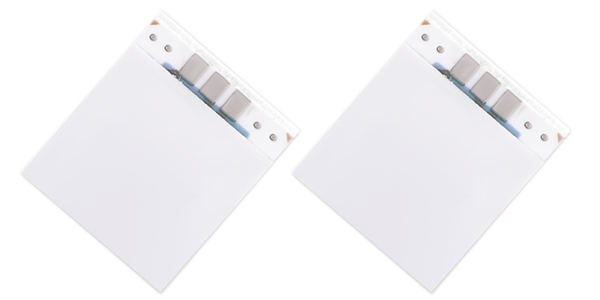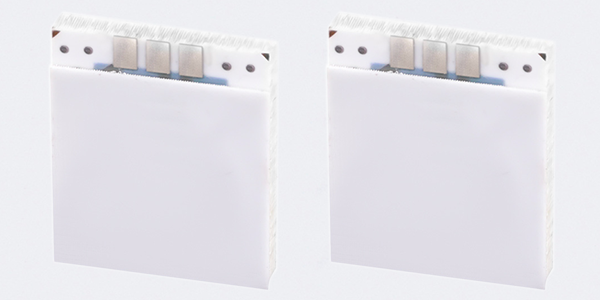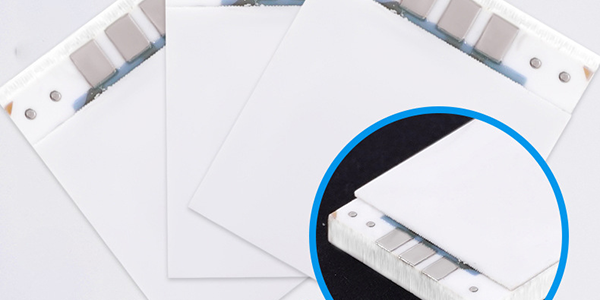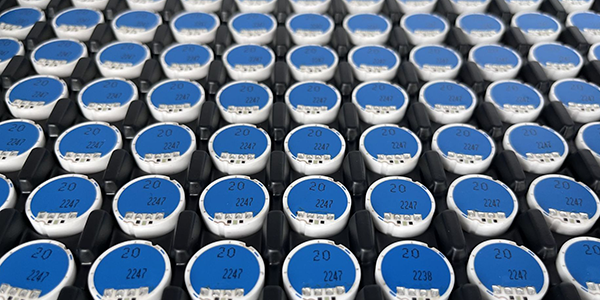Thick Film Capacitive Pressure Sensors
Thick Film Capacitive Pressure Sensors, also called Capacitive Pressure Sensors, combine ceramic substrates with thick-film hybrid circuit technology, where the ceramic substrate is processed into a durable, temperature-resistant element for stable performance under harsh conditions, and electrode material and dielectric layers are applied to form a capacitive structure that detects pressure and converts deformation into an electrical signal, ensuring high precision, stability, and long-term reliability for high-pressure, high-temperature environments.

Thick Film Capacitive Pressure Sensors work based on changes in capacitance. When pressure is applied to the ceramic substrate's sensitive element, the ceramic diaphragm deforms slightly, causing the distance between the electrodes in the capacitive structure to change. According to the capacitance formula C = εA/d, the capacitance varies inversely with the distance d between the electrodes, reflecting the applied pressure. This change in capacitance is converted into a measurable electrical signal by precision signal processing circuits, resulting in an output that is proportional to the pressure. This process provides high sensitivity and fast response.
Capacitive Pressure Sensors are widely used across various industries, including automotive, industrial control, medical, and aerospace sectors. In the automotive industry, they are primarily used to monitor tire pressure, engine oil pressure, and more. In industrial automation, they are commonly used for real-time monitoring of hydraulic and pneumatic systems, ensuring the stable operation of the system. In the medical field, capacitive pressure sensors are used in blood pressure monitoring devices and ventilators for pressure control. In aerospace, they are employed to detect cabin pressure and fuel system pressure in aircraft. These applications fully demonstrate the high precision, stability, and reliability of capacitive pressure sensors.

Features of Thick Film Capacitive Pressure Sensors :
● High Precision and Sensitivity: Based on the capacitive principle, pressure changes cause variations in capacitance, allowing for precise pressure measurement with high sensitivity and accuracy.
● Robust and Durable Structure: Ceramic materials have high mechanical strength and high-temperature resistance, allowing the sensor to work stably in harsh environments like high pressure and high temperature, ensuring long life and reliability.
● Strong Corrosion Resistance: Ceramic itself has strong resistance to chemical corrosion, so the sensor can operate normally in aggressive media, making it adaptable to a wide range of environments.
● High-Temperature Stability: Thick-film ceramic materials have excellent thermal stability, allowing the sensor to maintain consistent performance in environments with temperature fluctuations, making it suitable for high-temperature applications.
● Fast Response: Capacitive sensors can quickly respond to changes in external pressure, offering fast response times, which is ideal for real-time pressure monitoring applications.

Applications of Capacitive Pressure Sensors :
● Automotive Industry: Used in monitoring tire pressure, engine oil pressure, and air suspension systems in vehicles, ensuring normal operation of pressure parameters during driving.
● Industrial Automation: In hydraulic and pneumatic systems, thick-film ceramic capacitive pressure sensors are used to monitor pressure in real-time, ensuring system stability and preventing malfunctions caused by abnormal pressure.
● Medical Field: In medical devices, thick-film ceramic capacitive pressure sensors are used in blood pressure monitoring instruments, ventilators, and other devices to detect and regulate the pressure of gases and liquids, ensuring safety and accuracy during treatment.
● Aerospace: In aircraft and spacecraft fuel systems and cabin pressure monitoring, capacitive pressure sensors are widely used to monitor pressure and ensure flight safety.
● Oil and Gas Industry: In oil drilling, natural gas transportation, and storage, pressure sensors are used to monitor the pressure of equipment and pipelines, ensuring safe operation.
Through these applications, Capacitive Pressure Sensors demonstrate their exceptional precision, reliability, and durability, serving various high-demand industries.
For more information, Please refer to Thick Film Sensors.

Custom Thick Film Sensors
- Custom Thick Film Sensor Elements
- Fuel Level Sensor PCB
- Fuel Level Sensor Ceramic PCB
- Oil Level Sensor Ceramic PCB
- Motorcycle Fuel Level Sensor PCB
- Throttle Position Sensor PCB
- Throttle Position Sensor FR4 PCB
- Throttle Position Sensor Ceramic PCB
- Throttle Position Sensor Flexible PCB
- Accelerator Pedal Sensor PCB
- Accelerator Pedal Position Sensor PCB
- Pedal Position Sensor Carbon PCB
- Potentiometer PCB
- Linear Potentiometer Carbon Track PCB
- Rotary Potentiometer Carbon Track PCB
- FR4 Potentiometer Carbon PCB
- Ceramic Potentiometer Carbon PCB
- Flexible Potentiometer Carbon PCB
- Logarithmic Taper Potentiometer PCB
- Position Sensor PCB
- FR4 Position Sensor Carbon PCB
- Ceramic Position Sensor Carbon PCB
- Flexible Position Sensor Carbon PCB
- Flexible Sensor PCB
- Printed Flexible Electronic PCB
- Printed Carbon PCB
- Ceramic Pressure Sensors
- Ceramic Thick Film Pressure Sensors
- Engine Oil Pressure Sensor PCB
- Gold Coated Ceramic Substrates
- Gold Coated Thick Film Substrates
- Metallized Ceramic Substrates
- Multilayer Thick Film Substrates
- Thick Film Metallization Technology
- Thin Film Metallization Technology
- Thin Film Ceramic PCB
- Variable Resistor Carbon PCB
- Remote Ready Sender Ceramic PCB
- LP Gas Tank Gauges Ceramic PCB
- Thick Film Capacitive Sensors
- Thick Film Capacitive Pressure Sensors
- Thick Film Edible Oil Quality Sensors
- Thick Film Meteorological Rainfall Sensors
- PI Interdigital Electrodes (Flexible)
- Air Door Actuator PCB
- HVAC Blend Door Actuator PCB
